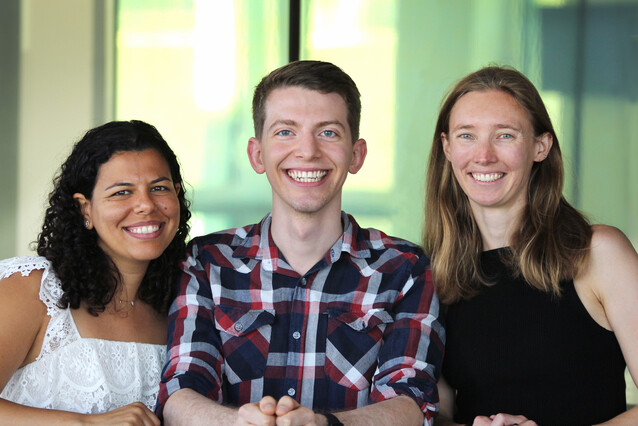Hat-trick for Pauli Lab: three fellowships for postdocs and student
Three prestigious fellowships were awarded to members of the Pauli Lab: postdoc Amena Nabih received an SNF fellowship; postdoc Ida Marie Astad Jentoft an EMBO fellowship; and Vienna BioCenter PhD Student Josef Röhsner a DOC fellowship of the Austrian Academy of Sciences.
The fellowships, each highly competitive and prestigious, will support research of postdocs Amena Nabih and Ida Marie Astad Jentoft, as well as PhD student Josef Röhsner. Scientists in the Pauli lab study fertilization and cellular remodelling in zebrafish, a common model organism in developmental biology.
Swiss National Science Foundation (SNSF) fellowship for Amena Nabih
Age-related decline in egg quality is a significant factor in female infertility. The process by which a fertilised egg develops into an embryo relies on highly intricate gene regulatory events, which hinge on the maternal contribution to the embryo. This includes genetic material and essential biomolecules (such as RNAs and proteins) and organelles. One important element involved in driving this transition is the end of the messenger RNAs (mRNAs), composed of the 3' untranslated region (3'UTR) and the polyA-tail. Together, they influence mRNA stability, degradation, and translation. The length of the polyA-tail and nature of the 3’UTR of these mRNAs is crucial and undergo regulated changes during the oocyte-to-embryo transition to ensure proper translation timing.
It is poorly understood how changes in 3'UTR composition and polyA-tail length affect egg quality with age, or what cellular mechanisms are involved. Using zebrafish as a model, Amena Nabih aims to uncover the molecular basis for age-related changes in egg quality, focusing on post-transcriptional gene regulation.
Nabih studied biology at Queen’s University in Kingston, Canada. She then made her first foray into the world of developmental biology in the lab of Julie Claycomb at the University of Toronto, where she pursued a Master’s in molecular genetics. Nabih then completed her PhD at ETH Zurich, where she examined different mechanisms of transcriptional and post-transcriptional gene regulation in mammalian systems in the labs of Stefanie Jonas and Constance Ciaudo.
Based on a government mandate, the Swiss National Science Foundation (SNSF) supports scientific research in all academic disciplines. SNSF funding has supported over 5500 projects involving more than 20,000 researchers, making it the leading Swiss organisation for the promotion of scientific research. The SNSF postdoc fellowships were launched as a Swiss match to the EU’s Marie Skłodowska-Curie Postdoctoral Fellowships.
EMBO fellowship for Ida Marie Astad Jentoft
Ida Marie Astad Jentoft uses the African turquoise killifish (Nothobranchius furzeri) to investigate the molecular mechanisms of translation regulation during embryonic diapause. Some killifish evolved unusual survival strategies to address the extreme environmental conditions of their habitat, temporary ponds in southeast Africa that dry out during the dry season. The adults perish, but the embryos survive by putting their development on hold. This temporary suspension of embryogenesis is called diapause, and has evolved independently in not only killifish, but a wide range of both vertebrate and invertebrate species to ensure the survival of the next generation. Jentoft’s research builds on the expertise in the Pauli lab in investigating translational regulation in dormant systems, and the scientific environment and facilities at the IMP.
Ida Marie Astad Jentoft studied molecular biomedicine at the University of Copenhagen. With funding from a Boehringer Ingelheim Fonds fellowship, Jentoft then joined the lab of Melina Schuh at the Max Planck Institute for Multidisciplinary Sciences in Göttingen, Germany, for her PhD. Her doctoral research investigated the role of cytoplasmic lattices, long-lived filamentous structures specific to mammalian egg cells, in storing maternal proteins to ensure their faithful inheritance to the embryo. Jentoft’s research was recognised with an International Birnstiel Award; as well as an Otto-Hahn-Medal, and Otto-Hahn-Award of the Max Planck Society.
Awarded for up to two years, EMBO Postdoctoral Fellowships support excellent postdoctoral researchers throughout Europe and the world for a period of up to two years. International mobility is a key requirement. Awardees can attend an EMBO Laboratory Leadership course and become part of the global network of EMBO Fellows.
Austrian Academy of Sciences DOC fellowship for Josef Röhsner
Protein synthesis is a highly energy-consuming process that requires tight regulation. Recent research from the Pauli lab (Leesch, Lorenzo Orts et al. 2023) discovered a set of conserved factors that stabilise ribosomes and repress translation in zebrafish and Xenopus eggs. While it's known that this network helps store ribosomes and regulate translation in eggs, little is understood about how these factors are released from “dormant ribosomes”. Additionally, it is unclear if this ribosomal dormancy mechanism applies to other cells.
Interestingly, one key dormancy factor, Dap1b/DAPL1, is found in various quiescent somatic cells in mammals, suggesting that dormant ribosomes might also regulate translation in these cells. Josef Röhsner’s PhD research aims to uncover how dormancy factors bind and release from ribosomes and to explore if dormant ribosomes exist and function similarly in quiescent mammalian cells. His research could reveal a previously unrecognised mechanism of translational control in quiescent cells and improve our understanding of cellular energy regulation and protein synthesis.
Josef Röhsner studied at the University of Vienna. He was first introduced to the Vienna BioCenter through an internship with Luisa Cochella shortly before joining Verena Jantsch-Plunger’s lab at the Max Perutz labs in 2019. Röhsner started his Master’s studies in Vienna, before moving to the NKI (Netherlands Cancer Institute) in Amsterdam. He graduated in early 2022 and returned to Vienna for his doctoral studies with Andrea Pauli. In 2023, he was presented with the Lauwers Award .
The DOC Fellowship Programme of the Austrian Academy of Sciences offers funding for highly qualified doctoral candidates in all areas of research. The fellowships are intended to allow young researchers to dedicate themselves to working in focused fashion to complete their doctoral thesis within a clear timeframe.
Further Reading
